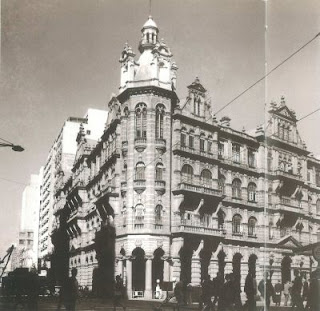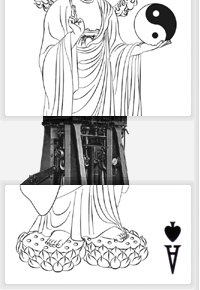標籤:
明日黃花,
倉海君
Y.T. 在《皇后之戰的教訓》中提到:
It may be untimely to ask this question, but it seems that few supporters of heritage preservation have ever asked it seriously. I mean: Why are we suddenly so enthusiastic about heritage preservation, in particular the preservation of tangible heritage, while at the same time history, and the sense of it, becomes increasingly detached from the social world of ordinary citizens? People in the 50s, 60s, perhaps even the 70s needed no heritage preservation, because they felt strongly the link with the past: in the present the past lived. To demolish an old building was, for them, no disruption of the continuity of tradition; for tradition was no sterile thing: it welcomed, and ought to welcome, creative destruction.
Ever since what time, shall we not wonder, has our city, or the whole modern world indeed, become so attached to the notion that every act of destruction must be disruptive, and that tradition--if there be still such a thing--msut be so weak and so brittle that it needs a bandage at every turn and twist?
It often occurs to me very ironic that China, a civilization which is not unknown for its deep sense of history, has not, until very recent times, preserved the said sense by preserving tangible objects; in history books, in literary creations, in popular plays, in communcal festivities and daily allusions: in all this the past lives. No museum is necessary to preserve an armoured corpse.
It is often said, nowadays, that by preserving tangible heritage the next generation would know more about the past of HK; I doubt it. The UK has probably endeavoured not a little to preserve its tangible heritage; and there stands also the long honourable history of a BBC commissioned to educate the Britons about their country and their past. Then what? No less a historian than N. Ferguson has warned that, on go the current history curriculum, and the next generation of Britons would likely know as much history as only the names of Henry and Hitler.
This, I concede, is not to establish a presumption for the uselessness or meaninglessness of preserving tangible heritage; it should, nevertheless, invite some thinking as to whether the opposite presumption be not less promising than it seems to be. Queen's Pier has commanded the Victoria Harbour for many years; has its presence shaped the identity of the HK populace, their idea of this place and their vision about the future, a little?
我覺得這是比較另類且有啟發的見解,亦大致認同,所以特別張貼出來,並附上回應兩則:
Y.T.,
你上述很多論點,我記得你曾經寫過,我甚至在這兒推介過你那篇文章。有幾點也許值得深入討論一下。
1.It often occurs to me very ironic that China, a civilization which is not unknown for its deep sense of history, has not, until very recent times, preserved the said sense by preserving tangible objects; in history books, in literary creations, in popular plays, in communcal festivities and daily allusions: in all this the past lives.
所謂歷史感,我會定義為對自身歷史文化的認知、對傳統(特別是最富內在價值那部分)的承擔,和對身份一貫性的維護。一國之載籍或風俗保存了歷史痕跡並不為奇,但似乎不能立即據此便斷定中國文化有歷史感。如果說猶太人有deep sense of history,我會完全同意;但中國文化由春秋晚期開始,道術分裂,散於天下,官學傳統一斷,已難言富歷史感。戰國時趙武靈王效胡服,已變中國衣冠之制;雅樂漸次失傳,乃代之以胡樂;舉凡語言、禮俗、器具、宮室等,無論有形無形,可謂無一不變,無時不變,劉師培就寫過一篇文,名字觸目驚心,叫《論中國並不保存國粹》,可以參看。我只能說,中國最富歷史感的時代,到東周而止,因為之後已沒有人理會原始中國文化中那種循環和「歸根」的哲學涵義,而不明白這種原始哲學(我認為正是中國文化精髓所在),原來充沛的歷史感便失去創造力,而淪為罪該萬死的迂腐和守舊了。
總的來說,我不認為中國文化(至少在周代以後)特別富歷史感,但我會認為,"People in the 50s, 60s, perhaps even the 70s"未必有今天保育青年的所謂"身份危機感",所以那年代的人亦不會覺得自己的"回憶"需要貼身保護吧?而最有趣的問題是,假如青年從沒有聽過"身份危機"、"解殖"這類詞彙,他們又會如何思考呢?他們是真正的思考過?還是按照現成詞語作句?我會比較關注這問題多一點點。
2. Why are we suddenly so enthusiastic about heritage preservation, in particular the preservation of tangible heritage, while at the same time history, and the sense of it, becomes increasingly detached from the social world of ordinary citizens?
我不大認為抗議人士是enthusiastic about heritage preservation,在我日常接觸的香港人當中,我也沒遇過。當然,我的主觀感覺不值一提,且讓我們看看保育青年自己的話:
回到皇后此一歷任港督舉行登岸儀式的「殖民地標」,我們不告別,是因為殖民地威權作風並未隨九七回歸而遠去,那些「不民主的政治體制」、「虛情假意的諮詢制度」和「漠視本土人民生活的城市規劃模式」等殖民遺產,已悄悄地「過戶」予「回歸後特府」。換言之,就像波蘭人記憶納粹主義的目的一樣,記憶皇后也是為了抗拒殖民主義於我城借屍還魂,更進一步,就是要在回歸後開展一場遲來的解殖運動。(陳景輝﹕為何不告別? 一個皇后碼頭守衛者的自白)
Y.T.,根本一直講sense of history的,就只有你一個吧?但很遺憾,他們覺得重要的,是偉大的「解殖運動」,要認真討論文化歷史?小心
巴迪烏借屍還魂啊!你問:Queen's Pier has commanded the Victoria Harbour for many years; has its presence shaped the identity of the HK populace, their idea of this place and their vision about the future, a little?我不排除有人會這樣想,既然大家有信仰自由,我無法不尊重。
舊作重溫:
我認同的歷史感(轉載文章兩篇)前世唔修*******
補記:剛看到
ESWN宋公子的
「調查報告」,在評論皇后事件的眾多文章中,這篇是我見過最有趣的。有趣的地方不單在於這個小型調查的受訪者--跟很多網友不同--毫不在乎皇后的存亡,更在於他們的意見,對聲稱代表「群眾」的保育團體來說,可謂活生生的諷刺。我一時好奇,也想效法宋公子訪問幾個人。
一是家母,她在香港生活了超過五十年。我問:「你有一些跟皇后碼頭相關的回憶嗎?」「以前會經過,但沒留意。沒什麼回憶可言。」我再問:「你同意拆掉碼頭嗎?」「與我何干?」她頓一頓,補充說:「如果要懷念,我只會懷念中環郵政總局。」我問:「為什麼?」「因為漂亮。」
二是外婆,她在香港住了六十年。但最後我始終沒問,因為我可能要花五分鐘聲嘶力竭地解釋我的問題,結果還很可能不得要領。只是一點可說,她看新聞報導皇后抗爭的場面時,會自發地吐出一句:「多餘!」我想這已經足夠闡明她的立場。
三是msn上一位廿多歲的女性友人,是土生土長的香港人。問她皇后碼頭,她說:「關我鬼事。」之後便中斷話題。
四是掬香齋主人。這夜跟他通電,主要閒聊最近看書發現了什麼有趣東西,順便問起皇后碼頭。他說:「沒什麼特別感覺,我反而覺得以前拆掉郵政總局更可惜。皇后並不漂亮,而且天星都沒有了,剩下一個皇后也沒意義。」我說:「其實像一個人,99%的皮已給剝掉了,剩下腳趾尾那一小寸皮又有何用?」他說:「你令我想起一些欺騙無知少女的敗類,他們喜歡哄女孩說:『你都唔係處啦,不如拋個身出嚟算啦。』聽起來好像很有說服力。」

(中環郵政總局,攝於1960年)
我訪問的四個人,都是我熟悉的,很普通的香港市民,沒政治傾向,既沒有去伊朗學波斯文也不在乎市民抗爭史,更不像「文化評論員」般關心什麼「解殖」。在網上發表親友的意見不是不冒險的,因為有很多人會認為你不反對拆皇后就是「愛國份子」,立即和維園阿伯齊名,正如梁文道在《
時間站在我們這邊——給林鄭月娥的一封公開信》所言:
我不怪你,因為還有許多你的同代人覺得這是英殖餘緒,是國恥,不只不能留而且早就得拆。如果他們住在大陸,他們一定也要想辦法拆走僅餘的日軍「慰安所」。
這種邏輯的可怖之處在於:只要你不反對拆皇后,那麼你的理由就必然是認定皇后乃國恥了;一認定皇后乃國恥,那麼就暗示着你很可能是維園阿伯之流了,多麼的順理成章。又假如你認為皇后不美,拆掉也不可惜的話,就會有網友批評:「你會令我覺得你好弱智。」所以我說,在網上公開自己親友的見解可能是很危險的,因為萬一他們不用「殖民/後殖民/解殖/集體回憶」角度來思考,你的親友也許會被視為「好弱智」,亦會被人批評為不理解「全新一代的價值觀與世界觀」(見《給林鄭月娥的一封公開信》),而時間,當然就更不會站在你們那邊了。後生之所以可畏,不是因為後生,而是他們自負得沒想過自己會老。















